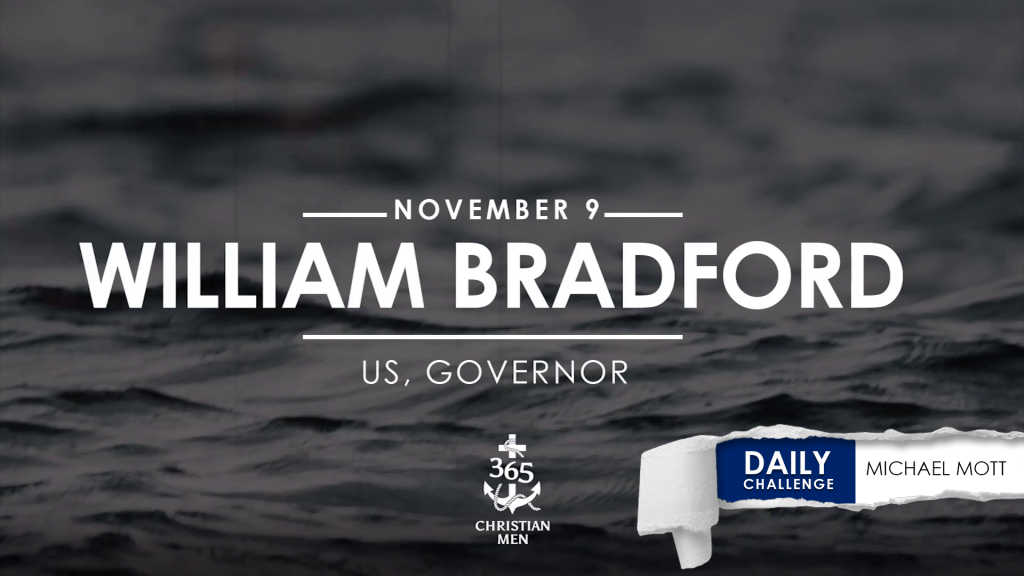November 9. William Bradford. In England in the early 17th century, a group of people longed to break free of government-controlled religion and serve God from their hearts. They were called Separatists. Though they endured terrible persecution, they refused to give up.
But when their young people started to be drawn away by people in Holland, Bradford warned that their children were being ruined “by evil example into extravagance and dangerous courses.”
Under Bradford’s leadership, they decided to relocate to a place where the government did not control religion.
The Mayflower was a merchant ship that usually carried wine and dry goods for sale. But now, 120 people set sail from a southern port in England. For 66 days, they sailed through rough and calm.
On this date in 1620, from the ship, Bradford first sighted the coast of the New World. He founded the Plymouth Colony and governed it for the next 30 years. This is today’s story.
Storms may rage, but a man of faith with a grateful heart can be at peace.
Off the coast of New England, the Mayflower pitched in the storm-whipped sea, and the weary pilgrims had to find a place to settle before winter landed on them. So, in a small vessel, they sent a party of brave men into the driving sleet to scout the coastline.
By mid-afternoon, no safe haven had been discovered, and Bradford prayed again for God’s direction. Hunkering down, he met the solemn gaze of his cold, red-faced fellow travelers. Responsibility for those huddled on the Mayflower weighed heavily upon him. He wiggled stiff fingers and toes to warm them and reminded himself that God controls everything.
Then with a sudden crack, the rudder broke.
The boat pitched. It was all the two men at the oars could do to steer the rolling boat. Waves swelled, and the wind intensified. Bradford’s attention turned from finding a new home to surviving. He bit back fear. Another storm.
Another opportunity to find God faithful.
The sun was hidden by dense clouds, and the deepening gloom warned night was near. The worried crew cast sails to outrun the dark, but a roaring gust shattered the mast, and the sails crashed overboard. Bradford’s prayers matched his breaths. If their lives were lost, what would become of those waiting for them aboard the Mayflower? He shook off the thought.
“About with her, if you are men!” cried the seaman. “Row lustily! We’ll find one place or other where we might ride in safety!” The oarsmen put their backs into it.
When he finally spied safe harbor, he whispered gratitude. It was completely dark now. The vessel bobbed in the sleeting rain, safe in the shelter of land. Soaked and cold, Bradford slept fitfully. About midnight the wind shifted to the northwest and froze hard. He prayed God would sustain them.
Finally, the sun rose bright. They had landed on an island. With barely veiled emotion, Bradford thanked God for his “manifold deliverances.” God, as He usually did for His children, gave them a morning of comfort and refreshing. They rested for the Sabbath and then sounded the harbor. It was good. If only the land, too, offered safety! On the mainland, Bradford discovered abandoned cornfields and little running brooks. Praise God!
When the party returned to the ship, there was great rejoicing on the Mayflower. Soon it docked in the newly discovered harbor, and the pilgrims stepped off onto solid ground.
There were no friends to welcome or inns to refresh their weather-beaten bodies. No houses—much less towns. But the pilgrims, “being thus arrived in a good harbor and brought safe to land,” fell upon their knees and blessed God. He had “brought them over” a “vast and furious ocean” and delivered them from perils and miseries.
Bradford wrote in his journal that their children would one day talk about how their fathers had crossed a great ocean and were ready to perish in the wilderness but were saved when they cried out to God. God heard their prayer and saw their adversities. Bradford’s words echoed those of the psalmist.
“Then they cried unto the LORD in their trouble, and he delivered them out of their distresses” (Psalm 107:6).
Who do you cry out to during life’s storms? Storms may rage, but a man of faith with a grateful heart can be at peace.
In wilderness he did me guide,
And in strange lands for me provide.
In fears and wants, through weal and woe,
A pilgrim, past I to and fro.
~William Bradford
Bradford, William. “From the Journal of William Bradford: The Pilgrims decide to emigrate to America despite the perils and dangers.” Pilgrim Hall Museum. Accessed August 8, 2020. https://pilgrimhall.org/pdf/Bradford_Passage_Emigrate.pdf.
Rhys, Ernest, and John Masefield. Chronicles of the Pilgrim Fathers. New York: EP Dutton & Co., 1910, page 173.
Story read by: Blake Mattocks





